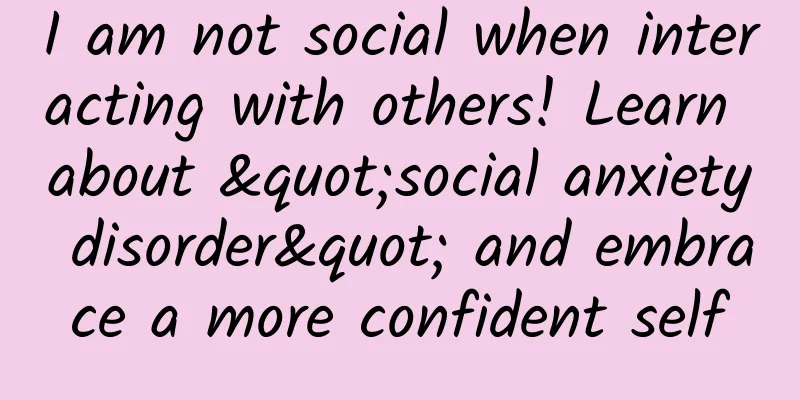I am not social when interacting with others! Learn about "social anxiety disorder" and embrace a more confident self

|
Xiaofang, 29, is a computer programmer at a company. After being promoted to a management position, she began to feel more stressed. She gradually became nervous around unfamiliar people, worried that they would laugh at her for saying something stupid or making social faux pas. She often felt "terrified" to speak in front of a group. When she has to communicate with others, she experiences palpitations, dry mouth, and sweating. During meetings, Xiaofang often thinks that she might say something very stupid or make a terrible mistake, so she avoids important meetings several times, which seriously affects her work and life. Experts at the Second People's Hospital of Hunan Province (Hunan Brain Hospital) suggest that Xiaofang suffers from social anxiety disorder. Social anxiety disorder (SAD), also known as social phobia disorder, is a type of anxiety and phobia disorder with persistent tension or fear in social situations and avoidance of social behavior as the main clinical manifestations . In the United States, the lifetime prevalence of social anxiety disorder is 13.3%, which is more common in women than in men. The average age of onset is 15 years old, and the first treatment is an average of 12 years after onset. Up to 80% of patients have never received treatment, 70% of patients have a low level of education, and 22% of patients are unable to work. 1. What is the main cause of the disease? Studies have shown that genetic factors play an important role in the onset of SAD, with a heritability of 30% to 65%. In the development of SAD, possible risk factors include overprotection, neglect and abuse in childhood, excessive control or criticism of behavior, poor parental marriage, lack of intimacy, and poor school performance. Children who grow up in this environment often have distorted social cognition, are accustomed to giving negative interpretations to ambiguous events, give catastrophic interpretations to negative events, and often have continuous negative self-reflection. Some patients may have experienced traumatic and "humiliating" social events. 2. What are the core symptoms? The core symptom of social anxiety disorder is a significant and persistent worry about appearing embarrassed or awkward in public, and worrying that others will laugh at or make negative comments about themselves. When others are watching them intentionally or unintentionally, the patient becomes more restrained, nervous and uneasy, and therefore often avoids social behavior. Although patients realize that this tension and fear are unreasonable, they still try to avoid relevant social occasions. In extreme cases, it can lead to self-social isolation. They are nervous and uneasy about upcoming social interactions and have strong anxiety and pain when socializing. They blush, have trembling hands, and dare not look people in the eye. They leave in a hurry after completing the necessary social behaviors as much as possible. These avoidance behaviors can seriously affect the patient's personal life, professional function, and social relationships. Social anxiety disorder patients often experience social anxiety when eating in public, speaking in public, signing important documents under the gaze of others, meeting the opposite sex, and in school environments. Some scholars believe that there is a symptom continuum from shyness to avoidant personality disorder to social anxiety disorder. Some patients may relieve anxiety through substance abuse and eventually develop substance dependence, especially alcohol dependence. 3. What are the main treatment methods? Treatment includes cognitive behavioral therapy and drug treatment (antidepressants are preferred). Experts recommend that patients seek medical attention in a timely manner and receive regular treatment. Hunan Medical Chat Special Author: Liu Zhiying, Hunan Second People's Hospital (Hunan Brain Hospital) Follow @湖南医聊 to get more health science information! (Edited by YH) |
>>: Mom's Health Class: Understanding and Dealing with Stress Urinary Incontinence
Recommend
What should we pay attention to when using ibuprofen, which has the effect of reducing fever and relieving pain?
Author: An Luoling, Chief Pharmacist, Beijing Cha...
What are the dangers of bicornuate uterus?
Once many women have problems, they should take t...
What should I pay attention to when eating apples and yam together? Can apricots and apples be eaten together?
Apples contain a lot of minerals and vitamins, an...
Health Tips for the May Day Holiday
The 2023 May Day holiday is here. Come and take a...
Is it better for the uterus to be forward or backward?
When women are pregnant, they often have a questi...
How to eliminate forehead wrinkles the fastest and best
Many girls find that after they have forehead wri...
Risks of Nipple Surgery
Women cannot accept any flaws in their breasts, b...
How to massage breasts to release milk
During the confinement period, mothers are always...
What are the symptoms of postpartum depression?
Postpartum depression is a mental illness that is...
Precautions for sugar screening
There are many things to pay attention to when do...
What can women eat to replenish their energy?
Nowadays, women are constantly busy in society an...
Why do you have diarrhea in early pregnancy?
I believe the health of pregnant women is an issu...
What are the symptoms of hyperthyroidism in women?
Hyperthyroidism is a common disease in life. Peop...
What should I do if I discover an ectopic pregnancy one month later?
An abnormal pregnancy process in which the fertil...
Fetal abdominal circumference standard reference table
In order to ensure the healthy growth of the fetu...









